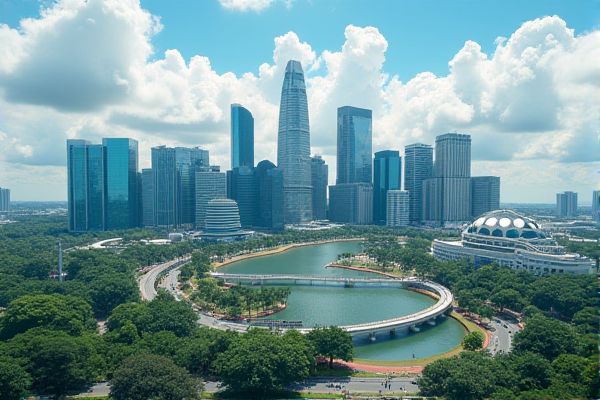
Insights from Singapore residents and expatriate communities: Multicultural environment and diverse communities. Efficient public transportation system. High standard of healthcare services. English as the primary working language. Stringent laws and regulations. Costly living expenses, especially housing. World-class education opportunities. Safe and clean cities. Enjoy diverse culinary experiences. Strong emphasis on work-life balance.
Multicultural environment and diverse communities
Singapore's multicultural environment is characterized by four primary ethnic groups: Chinese, Malay, Tamil, and others. The nation embraces a rigorous multicultural policy that promotes pluralism, integration, and tolerance while enforcing strict measures against racial intolerance. This harmonious coexistence is further enriched by accommodating a significant expatriate community through various social and cultural clubs and societies. These efforts contribute significantly to the country's success, as discussed in the detailed analysis on Economic Success. By fostering a cohesive society, Singapore's policies ensure that all cultural groups are respected and their contributions to the country's vibrant tapestry are recognized.
Efficient public transportation system
Singapore residents and expatriate communities benefit from an efficient public transportation system that has increased public transport usage from 59% in 2008 to 66% in 2015, with a goal of 75% by 2030. This system provides integrated, convenient, and affordable services, including discounts for low-wage workers and persons with disabilities, as well as real-time information to streamline commuting. The city's innovative approach and commitment to sustainable urban mobility is highlighted in this Cities100 Singapore case study, demonstrating how boosting public transit while limiting car usage can create a sustainable future.
High standard of healthcare services
Singapore's healthcare system is highly praised by both residents and expatriates for its efficiency, high-quality services, and English-speaking medical staff. Ranking as the sixth best globally, the system presents minimal language barriers and a robust infrastructure to serve diverse needs. For more detailed information, you can refer to this Comprehensive Guide to Healthcare for Expats Living in Singapore, which provides valuable insights into navigating medical services in the country.
English as the primary working language
In Singapore, English serves as the primary working language, acting as a lingua franca that bridges the diverse ethnic groups and facilitates the country's integration into the global economy. It is used in formal settings such as the workplace, schools, and government, while Singaporean Colloquial English (Singlish) is more commonly used in informal settings.
Stringent laws and regulations
In Singapore, expatriates must comply with stringent laws and regulations, including the Employment Act which governs working hours, rest days, overtime pay, and employment termination procedures. Additionally, they must also adhere to specific visa requirements and taxation rules to ensure legal residence and employment. For a comprehensive understanding of these regulations, BBCIncorp provides an insightful guide for expats moving and working in Singapore.
Costly living expenses, especially housing
Housing costs in Singapore are exceptionally high, with rental prices almost three times more expensive than in the UK. The scarcity of land significantly drives the conservative rise in living costs, leading to a subsequent increase in housing prices. Singapore boasts the most expensive rental properties in the Asia-Pacific region, with median monthly rent around S$3,455 (US$2,600). This financial burden makes housing the most significant expense for expats and locals alike, with average monthly rents ranging from $520 for a 1-bedroom apartment to $45,000 for a 4-bedroom apartment. For a comprehensive understanding of how these dynamics affect the Cost Of Living in Singapore, you can explore [New Naratif](https://newnaratif.com/explainer-calculating-the-cost-of-living-in-singapore/), a platform that delves into the intricate details of Singapore's economy. Housing and utilities account for 24.8% of the Consumer Price Index (CPI), significantly impacting household budgets, especially for those residing in central areas where property prices are among the highest.
World-class education opportunities
Singapore offers world-class education opportunities, with local schools being highly competitive and affordable, although they can be challenging for expat children to enter due to preference given to Singaporean citizens. International schools, many of which follow the International Baccalaureate curriculum, provide an alternative with a more familiar and nurturing environment for expat students.
Safe and clean cities
Singapore is highly regarded by both residents and expatriates for its exceptional safety and cleanliness, with low crime rates, robust infrastructure, advanced health security, and stringent environmental measures. According to Forbes Advisor, these qualities make Singapore the safest city for tourists in 2024.
Enjoy diverse culinary experiences
Singapore residents and expatriate communities can enjoy diverse culinary experiences by exploring vibrant neighborhoods like Little India, Chinatown, and Kampong Glam, where they can sample aromatic Malay curries, flavorful Indian spices, and Chinese rice and noodle dishes. Through guided food tours and visits to hawker centres and family-owned eateries, locals and visitors alike can immerse themselves in the rich tapestry of Singapore's food culture. To discover more about these culinary journeys, you can explore the Singapore Food Tours website for detailed insights and recommendations.
Strong emphasis on work-life balance
In Singapore, both residents and expatriates are increasingly prioritizing Work-Life Balance, with a significant percentage of employees considering job changes to enhance it. The focus is on flexible work arrangements, convenient work locations, and employee well-being, all of which are supported by governmental and employer initiatives. For more in-depth insights, you can explore the full article on HRM Asia.
